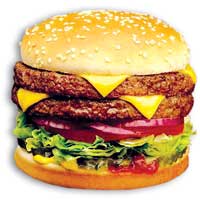 Someone once observed that the West of full of fat people wanting to be skinny, while people from developing countries would simply love to grow a paunch and a wide pair of hips. Like all aphorisms, there are elements of truth here. I'd like to take it one step further. In America, the poor are overweight and rich slim and trim. Nepalis, Botswanans and Hondurans, by contrast, are thin if they're poor, pudgy if they have money.
Someone once observed that the West of full of fat people wanting to be skinny, while people from developing countries would simply love to grow a paunch and a wide pair of hips. Like all aphorisms, there are elements of truth here. I'd like to take it one step further. In America, the poor are overweight and rich slim and trim. Nepalis, Botswanans and Hondurans, by contrast, are thin if they're poor, pudgy if they have money. Fat is definitely a class issue here in the USA. Drive the backstreets of various Miami neighborhoods, as I do, and judge the median income by examining posteriors. Wiggly, sagging ones belong-almost invariably-to the non-white, working poor, the immigrant, the trailer-park folk who are proud only of the their white skin and European descent. Rich areas, when the security let you in, are chockablock with exercising semi-athletic fifty-somethings, svelte and fit, barely sweating into designer gym clothes.
A recent study rings alarm bells for an overweight society.
Nearly 60 percent of children, it found, are putting on dangerous amounts of weight. It's called the 'super-size' culture. Go to McDonalds, order a milkshake, burger and French fries and for a few extra dollars, 'super size' your lunch. In French fries alone, you're getting 400 more calories of food energy. The less said about the national habit of drinking two and three litre soft drinks, the better. But I will ask one rhetorical question: where do people find the bladder space to put all that cola?
The quantity of food delivered up in a single plate serving in American fast food restaurants over the past twenty years has gone up by more than 60 percent. And that's before the super-size. European visitors to the US are frequently shocked by the huge plates of food that restaurants offer, and the popularity of 'all you can eat' buffets. Much of the anger in France towards American burger joints is less about the nationality of the company than the way in which the entire ethic of fast food attacks the French notion of dining, enjoyment and quality. Again though, it's the American working folk who demand this cheap food in vast quantities. Many rich Americans are almost honorary Frenchmen when it comes to what they eat.
Just down the street from McDonalds, Burger King, Kentucky Fried Chicken and all the rest, pop into the sort of trendy bistros and caf?'s favored by the rich and see what they're eating. Why, tiny quantities of exquisitely prepared Nouvelle Cuisine, Italian-Thai fusion and so on. They even take salad over potatoes, carrots over rice. All drizzled nicely in aged Balsamic vinegar and garnished with sun dried Porcini mushrooms, of course. The people bent over the plates, chewing, are usually thin and fully aware of what they eat each day. Nor do they wash the food down with beakers of soda pop. A diminishing few sip fine wine, but mostly it's bubbly mineral water, devoid of calories or fat-making potential.
A few Americans have tried to sue the fast food industry for making them fat. Poor people using lawyers to redress imbalances in a grand American tradition. But food in the US is a matter of freedom of choice, and the courts are having none of it. Congress in Washington is debating a law to ban such lawsuits. Give it a thought next time you tuck into some dal bhat. Think how far Nepal has to go before it joins the developed world. And wonder if it's really the place to be.



